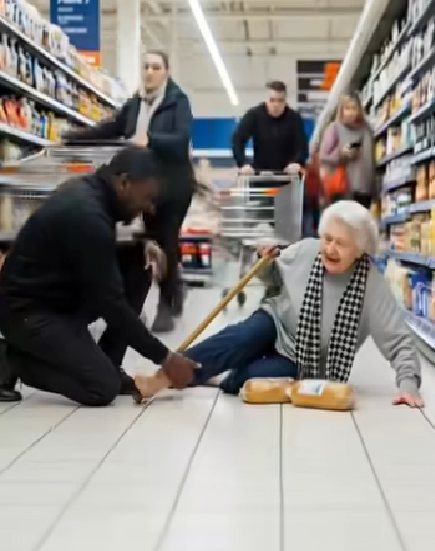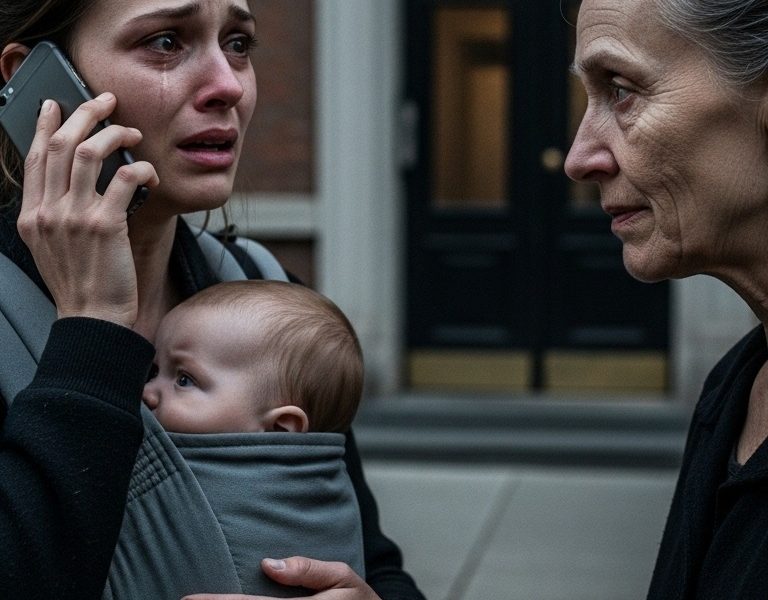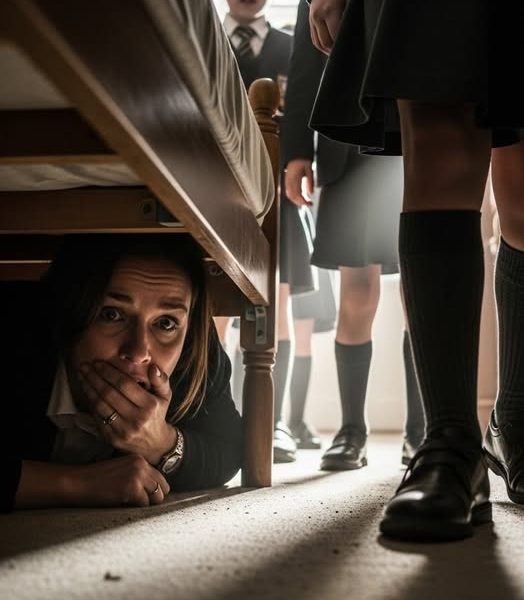The supermarket doors slid open with a tired hiss, letting in a gust of cold autumn air. A small woman, no taller than five feet and well into her nineties, stepped carefully inside. She leaned on her cane like it was part of her body, each step a quiet negotiation between will and weakness.
Her name was Mrs. Duarte, and though her back ached and her knees protested, she came for what she always did—bread, butter, tea, and soup.
She had lived long enough to remember when you could buy all four for a dollar. Now, every trip to the store was an act of courage. But she refused to ask anyone for help. She had taken care of herself her whole life—she wasn’t about to stop now.
The store buzzed with life. Carts rattled, price scanners beeped, voices blended in a constant hum. The aisles were bright, the shelves stacked high. Mrs. Duarte moved slowly, her scarf slipping loose from her silver hair. She squinted at the butter prices and sighed. Even essentials had become luxuries these days. Still, she smiled softly to herself, whispering numbers under her breath. She’d make do, as she always had.
A Fall No One Wanted to See
Near the end of Aisle Seven, her shoe caught on the edge of a floor mat. There was a sharp flash of pain—then the sound of her cane clattering away. Mrs. Duarte gasped and fell hard onto the cold tile floor.
The noise of the store didn’t stop. It swallowed her small cry whole. Heads turned for a second, then looked away. A man checked his phone. A woman kept comparing yogurt flavors. Someone frowned but said nothing.
Mrs. Duarte tried to lift herself. Her hands trembled against the slippery floor. Her hip burned. “Help,” she whispered, but the word barely reached her own ears.
She saw faces glance her way—then turn back to their shopping. Some looked uncomfortable. Others looked annoyed. She heard whispers that cut worse than the pain.
“Where are her children?”
“She shouldn’t be out alone.”
“Isn’t there staff for this?”
But no one came. No one bent down. No one spoke directly to her.
The Crawl That Broke Hearts Later
She drew in a shaky breath and started to crawl. Her palms pressed flat against the tile. Her knees scraped. The world seemed to stretch endlessly before her—a long, bright aisle filled with strangers who didn’t want to see.
She reached for her cane but it was too far. Her breathing grew ragged. She whispered to herself, “Almost there.”
A teenager nearby lifted his phone to film. Someone else walked around her as if she were a spilled jar. A few stared, unsure what to do, and did nothing at all.
It was one of those moments when time stands still—when everyone sees the same thing but waits for someone else to move first.
The Man in Black
Then, from the far end of the aisle, a young man in a black hoodie stopped. He had earbuds in, his hood up, and the kind of look people tend to avoid without even realizing why.
But something in his stride changed. He paused, took out his earbuds, and looked again.
He crouched beside her. “Ma’am,” he said gently, “can I help you?”
She blinked, startled. “I—I don’t want to be a bother.”
“You’re not a bother,” he said firmly. “You’re someone who slipped.”
He set his phone down—not to film, but to call for help. “Hi, I’m at Suncrest Market, Aisle Seven. Elderly woman may have a leg or hip injury. Please send first aid.”
His tone was calm, steady, certain. He folded his hoodie and placed it under her hip to cushion the cold tile. “Don’t try to get up yet. I’ll stay right here.”
He looked around the aisle, meeting the eyes of those who had been watching. “You,” he said to a store employee, “please get the manager and a first-aid kit. Sir, grab two carts—we’ll make some space for her. And you,” he said to the teenager with the phone, “put it away and help me keep people back.”
Something shifted then.
The teenager’s face turned red. He tucked his phone into his pocket and stepped forward, awkward but determined.
Two carts rolled into place, forming a small square around Mrs. Duarte like a protective wall. A woman removed her cardigan and laid it gently across the old woman’s shoulders. Another man knelt beside her, murmuring, “My mother’s ninety-one. I should’ve helped sooner.”
When Help Finally Came
Within minutes, the store’s intercom crackled: “Code Care to Aisle Seven.”
A manager hurried over with a first-aid kit. A cashier arrived with bottled water. The young man stayed beside Mrs. Duarte, calm and unshakable. “My name’s Eli,” he told her. “I’m training to be an EMT. You’re safe now.”
She nodded, tears slipping down her cheeks—not just from pain, but from relief. Someone had finally seen her.
Eli asked softly, “Do you have someone we can call?”
“My neighbor, Camille,” she whispered, and recited the number.
He called. “Hi, this is Eli. Mrs. Duarte’s had a small fall at Suncrest Market. Paramedics are on the way. She’s okay, but could you meet us here?”
Camille’s voice was shaky but firm. “Tell her I’m already driving.”
The people around them exhaled together, as if releasing a held breath they didn’t realize they’d been holding.
What the Cameras Missed
When the paramedics arrived, Eli stepped aside, giving them space but staying close enough for her to see him. They lifted her gently, secured her to a gurney, and checked her vitals.
As they wheeled her toward the doors, Mrs. Duarte reached for his hand. “You have kind eyes,” she said softly. “My husband was a firefighter. He always told me, ‘We don’t walk past.’”
Eli smiled. “Mine taught me the same thing.”
The teenager hovered nearby, guilt heavy in his voice. “I’m sorry,” he said. “I was going to post it online. That was wrong.”
Eli nodded. “Then make it right next time. Help someone.”
A Promise in the Parking Lot
Outside, the autumn sun caught on the ambulance lights. Camille ran across the lot, hair flying, relief etched into every line of her face. “You promised me soup, not a heart attack,” she said, half laughing, half crying.
Mrs. Duarte chuckled weakly. “Guess I needed some excitement.”
The store manager came running out, holding a small paper bag. “For you,” he said, placing it on her lap. Inside were her groceries—the bread, the butter, and a box of her favorite tea. “On the house.”
She pressed a hand over the bag. “Thank you,” she whispered.
When the ambulance pulled away, the store fell quiet again—but something was different.
A New Kind of Lesson
Back inside, people lingered in Aisle Seven. The woman with the yogurt spoke softly to the teen. “I didn’t help,” she said. “Next time, I will.”
He nodded. “Me too. I’ll remember what he said—Code Care.”
A man who had filmed briefly looked at his phone, then deleted the video. He scrolled to a picture of his own mother and smiled sadly. “We can all do better,” he murmured.
Later that evening, Eli knocked on a small apartment door, holding a bouquet of mismatched flowers. Camille opened it, smiling. “You must be the man in black.”
Inside, Mrs. Duarte was resting on the couch, her leg propped up, tea steaming on the table beside her.
“You made quite a scene today,” she teased.
He grinned. “You made a lesson.”
He pulled a small notebook from his pocket. “I’m going to start something—free workshops at the store. Teaching people what to do when someone falls, how to help without harm. I’d like to put your name on it—‘Hosted by Mrs. Duarte.’ It’ll bring folks in.”
Her eyes sparkled. “Make sure the letters are big,” she said. “So even old eyes like mine can read them.”
The Day Aisle Seven Changed Everything
By the next weekend, a new sign hung near the entrance of Suncrest Market:
“Neighborhood Care Circle — Free Mini-Workshop: What To Do When Someone Falls. Hosted by Mrs. Duarte. Led by Eli, EMT Trainee.”
Shoppers paused to read it. Some smiled. Some took pictures. And right there between the bread and the butter, folding chairs appeared in a circle.
People gathered, not to shop, but to learn—to promise, in quiet ways, that they would not walk past again.
One small act had turned a grocery aisle into a classroom. A moment of fear had become a story of community.
Mrs. Duarte had simply gone out for groceries. But by the time she came home, she had reminded an entire neighborhood that kindness is never outdated.
It doesn’t take strength to lift someone. Just the courage to stop. To kneel. To care.
And in the space of a single afternoon, Aisle Seven became proof that one helping hand can change how a whole community sees itself.
Because one person stopped.
Because one person chose to care.
Because kindness, once it starts, never really ends.


